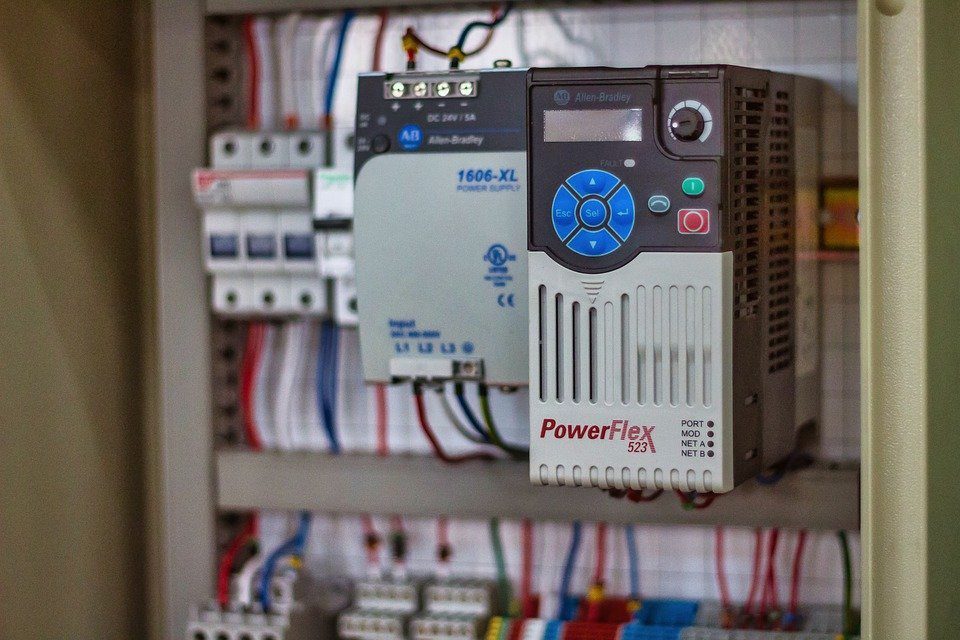The abbreviation for PLC is Programmable Logic Controller. In harsh industrial environments like extreme temperatures, wet, dry and dusty conditions, PLC is a specially designed computer that is programmed to operate under such conditions.
They are designed to make the industrial processes easier and automate them. These might include manufacturing a plant?s assembly line, waste water treatment plant, or an ore processing plant. PLCs have many similarities with the personal computers we normally use, like having a CPU, memory, input and output and software and mostly the same electronic components used to manufacture these.

The main difference between both is that PLC is designed to perform distinct continuous functions and are designed to best suit the harsh industrial environments. PCs on the other hand are more for use under normal environments.
Due to the increasing demand of automation and programming in the industrial requirements due to the nature of production, these Programmable Logic Controllers were made. They are designed according to the operational requirements of the industrial processes.
How Does It Work?
Programmable Logic Controller works in a cyclic scanning method which is known as the scan cycle. It includes the following steps:
- Cycling and monitoring of time is started by the operating system.
- The data from the input module is read by the CPU and it also checks the status of all inputs.
- The user or application program written in relay-ladder logic or any other PLC-programming language is executed by the CPU.
- Then all the internal diagnosis and communication tasks are performed by the CPU.
- The data is written into the output module according to the program results to make sure that all outputs are updated.
- As long as the Programmable Logic Controller is run mode, this process will continue.
Why Are They Important?
We can enlist the following reasons why they are important and considered to be more suitable for industrial use as compared to the regular PCs.
Reliability and Accuracy
The likelihood of PLCs failing is less than the standard PCs. They are accurate to a fault. With PLCs you can accurately monitor things such as your alarm, navigation systems etc. when it is correctly installed. This can prevent system malfunctions.
Reduced Maintenance Cost
With the advancement in science and technology manufacturers have been able to develop less complex PLC system. Most PLCs require constant maintenance because they don?t have hard drives or other moving parts. Due to this you can prepare a better charter and take your time in updating hard drives. It also allows you to spend less time and money on the system.?
Performance
As compared to standard PCs, PLCs can perform a variety of tasks that are far more complex. It can recycle itself within milliseconds and includes thousands of steps. As we previously mentioned, PLCs have few moving parts they respond rapidly and that is how they can react t performance tasks simultaneously.
Vessel Monitoring
Checking your vessel’s activity is basic for all ready. One misconception or breakdown can prompt a sudden debacle. Present day PLC frameworks work all the while and at lightning speed?permitting you to perceive what is happening from all points. PLC frameworks accompany power supply and a high level interaction for simple and advanced sources of info.
The PLC designing framework considers a high level organization correspondence that will give you appropriate data like electrical breakdowns, temperatures and pressing factors, and information interface. Likewise, PLC frameworks work with a large number of 24-volt power sources, shielding your vessel from generator breakdown.
Conclusion
PLCs are more likely to operate under harsh industrial environments unlike standard PCs. They have some common features with PCs and some similar electronic components in UK used to form them. They can operate better, performing discrete functions and giving a simultaneous view of the overall process.

As the editor of the blog, She curate insightful content that sparks curiosity and fosters learning. With a passion for storytelling and a keen eye for detail, she strive to bring diverse perspectives and engaging narratives to readers, ensuring every piece informs, inspires, and enriches.









